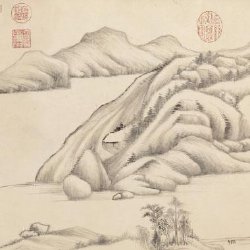

In the progressive reading Exists, Regarding and All represent a Dantesque sequence (see my comments on Exists for other allegorical dimensions). We note that as a “corner” book All partakes of two divinities, Hera and Aphrodite. Not surprisingly the conjunction of mother and lover risks discomfort. This, at least, was my initial response to its detailed landscapes, which provoked in me an overwhelming sense of the visual relieved only by MM’s record of the wild animals and moments of thought that occurred during his experience of Eastern Arizona’s imposing natural phenomena. (I am not a nature person.) Perhaps my view of the mode is egregious. Others, such as Wordsworth and Graves, have defended landscape poetry, even as a vehicle for complex human cerebration (“Any thought, no matter how complex,” says the latter, “may be expressed in terms of landscape”). Not that cerebration is MM’s purpose here. Like the monumental Chinese landscape painter, he seems instead bent upon escaping all merely human complexity in favor of a salubrious account of the American Southwest, one of the world’s most extraordinary regions. His descriptions, which extend the in situ method to a text without an intertext, achieves a purity of effect, through what Phelps has characterized as “exquisitely detailed scientific nature writing at the level of Thoreau.”
The full text of All
French translation by Dominique Letellier

